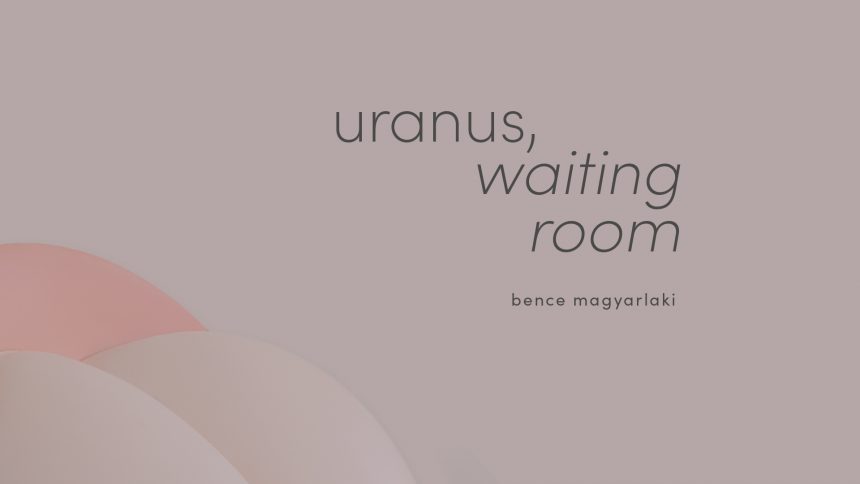The narrative of Uranus, Waiting Room centres itself around the idea of a utopian apartment, in which the laws of physics allow the individual to shred layers of their skin, flesh and internal organs and place them in positions of rest. Similar to when one arrives at a place that they call ‘home’, one would take off their shoes, their clothes, their assumed behaviours and mannerisms, their gender performance, and their restrained desires: an arrival giving room for introspection, isolation and intimacy. This is of course with the presumption that the individual does not arrive in any kind of normalized, often violent, domestic setting but to an apartment of their own on the planet Uranus. Such intimate exploration of the body becomes linked to the idea of a search for a home, or a search for belonging somewhere, to something. Uranus: Waiting Room, as the title suggests is not necessarily a complete arrival or a state of belonging to any particular existing notion of architecture, state, or nation. It is rather a state of suspense, an elongated experience of an interlude before a radical operation.
After all, an extra-terrestrial home-making project on any planet is – for now – a dream, a state of unconscious, or a utopia, yet it is a fantasy visualized often, part of the human imagination. The atmosphere of the planet Uranus is a particularly vile one, consisting of volatile light gases such as hydrogen and helium, methane and ammonia, and often appears in literature as a Planet for outcasts. As Preciado points out: since Uranus, the Greek god was castrated by his own son Chronos, Uranus the planet and the symbolism of its etymology did not cease to move the imagination of queer thinkers. One only has to think of Karl Henrich Ulrichs who coined the term Uranians in 1864 to refer to sexual relations of the third sex as he called it, all the while using the term to defend homosexual relations and his own desire for men at court. Or one might think of Jean Genet who fantasizes about moving to the planet in his Thief’s Journal (1949), in order to crawl on all fours with “all the convicts of his race”. Altogether Uranus and its history seem to be loaded with metaphorical meaning for the queer reader and Magyarlaki, by bringing it to his exhibition, intends to play with its historical weight and its atmospheric lightness. Just as the solid parts of anatomy become fluid interpretations and abstracted gestures, the exhibition invites its audience to release their ideas of a fixed self: this is a call for metamorphosing our subjectivity, to become as Preciado has, a dissident of the sex-gender system and in such state of suspense to create a new body, a body that is never singular or self-same.
Exhibition text, Bence Magyarlaki
‘Uranus, Waiting Room’ sergisindeki anlatı, bireyin derisini, etini, iç organlarını katmanlarına ayırarak dinlenmeye bırakmasına olanak tanıyan fizik yasalarının hâkim olduğu ütopik bir apartman dairesini merkezine alarak şekilleniyor. Tıpkı ‘ev’ olarak tanımlanan mekâna varıldığında ayakkabılar ve kıyafetler çıkarıldığı gibi eve gelen kimse varsayılan davranış ve tavırlardan, cinsiyet gösterilerinden ve kısıtlanmış arzulardan sıyrılıyor: söz konusu olan varış mahremiyete, kendini soyutlamaya ve gözlemlemeye yer açıyor. Bu varış elbette bireyin normalleştirilmiş, genellikle şiddet içeren, herhangi bir konut yerine Uranüs gezegeninde yer alan ve kendisine ait bir daireye ulaştığını varsayıyor. Bedenin böylesine samimi bir keşfi, kişinin ev-yuva arayışı ile bir yere veyahut bir şeye ait olma arayışıyla buluşuyor. ‘Uranus, Waiting Room’ başlığın da işaret ettiği üzere mevcut herhangi bir mimari, devlet veya ulus kavramına ait olma durumu veya mutlak bir varış değildir. Bundan ziyade bir gerilim halidir, radikal bir eylemden önceki fasılanın uzatılmış bir deneyimidir.
Ne de olsa, herhangi bir gezegende dünya dışı bir ev inşa etmek şimdiki zaman için bir rüya, bilinçdışı bir hal veya bir ütopyadır ancak yine de sıklıkla tahayyül edilen bir fantezidir, insanın hayal gücünün parçasıdır. Atmosferi hidrojen ve helyum, metan ve amonyak gibi uçucu hafif gazlardan oluşan, bilhassa sevimsiz ve tatsız olan Uranüs gezegeni, literatürde genellikle dışlanmışların gezegeni olarak anılır. Preciado’nun işaret ettiği gibi; Yunan tanrısı Uranüs’ün kendi oğlu Chronos tarafından hadım edilmesinden bu yana Uranüs gezegeni ve etimolojisinin sembolizmi kuir düşünürlerin hayal gücünü etkilemiştir. Bu bağlamda Karl Henrich Ulrichs’in kendi tanımıyla üçüncü cinsiyetin cinsel ilişkilerine atıfta bulunmak, aynı zamanda erkeklere duyduğu arzuyu ve homoseksüel ilişkileri mahkemede savunmak adına 1864’te ‘Uranians’ terimini icat ettiğini anımsamak gerekir. Hırsızın Günlüğü’nde (1949) “ırkının tüm mahkumları” ile dört ayak üzerinde emeklemek için bu gezegene taşınma hayalleri kuran Jean Genet de hatırlanabilir. Uranüs ve tarihi bir bütün olarak kuir okuyucu için metaforik anlamlarla yüklüdür ve Magyarlaki bu anlamları sergisine taşıyarak onun tarihsel ağırlığı ve atmosferik hafifliği ile oynar. Anatominin katı parçaları akıcı birer tabir ve soyutlanmış jestler haline geldikçe izleyiciyi sabit bir benlik fikrinden salınmaya eder: Bu, öznelliğimizi başkalaştırma, tıpkı Preciado gibi cinsiyet sistemine muhalif olma ve böylesine bir gerilimde hiçbir zaman kendisiyle aynı veyahut tekil olmayan yeni bir beden oluşturma çağrısıdır.
Sergi metni, Bence Magyarlaki
